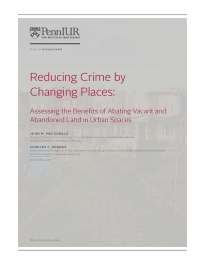Key Message
Remediation of vacant and abandoned land can significantly reduce urban crime and improve community well-being. The PLC program in Philadelphia, for example, has transformed over 12,000 vacant lots into maintained green spaces, resulting in notable reductions in shootings, assaults, and nuisance crimes. The program's success is attributed to its simplicity, scalability, and cost-effectiveness, as well as the active involvement of local community organizations and city agencies.
Studies have shown that the benefits of such interventions extend beyond crime reduction, fostering a sense of safety, increasing outdoor social activities, and providing economic opportunities for local residents. The PLC program alone has demonstrated a return on investment where every dollar spent generates significant savings in crime-related costs. The positive outcomes in Philadelphia have inspired similar initiatives in other cities, such as Youngstown, Flint, Baltimore, and Chicago, highlighting the replicability of this approach.
The brief concludes that addressing urban blight through community-driven land remediation not only curbs crime but also revitalizes neighborhoods, making them more attractive and livable. By focusing on changing places rather than changing people, cities can achieve large-scale crime reductions and foster a safer, more inclusive urban environment.




